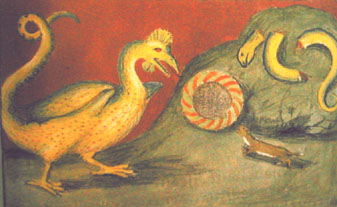
Despite the best efforts of Suzanne Stephens and Harry Sparnay there are still relatively few solo works for this beautiful and expressive instrument. Basilisk was written for the clarinettist John Chapman who gave it its first performance in Cambridge in 1978. It was recorded in 1986 by his student Gareth Stuart and it is this recording that features in the opening section of the composer’s Arts Council commissioned radiophonic documentary Spring Manouevres.
The work is the first part of a sequence of seven mythological beasts whose portraits, both mythological and in human manifestation, have been realised from Margaret Morgan’s cycle of poems of Man and Beast. The sequence is designed for a single performer on single read instruments: clarinet in Bb, clarinet in A, clarinet in Eb, bass clarinet in Bb, soprano sax in Bb, alto sax in Eb, tenor sax in Bb.


Above all, the performer should consider approaching the score as an actor might deliver the script of a soliloquoy. The Basilisk is, in essence, a highly confrontational piece of music theatre. The work is written as transposed for the bass clarinet in Bb sounding a major ninth lower than written.
Downloads
Study score [pdf]
1986 recording by Gareth Stuart [mp3]
